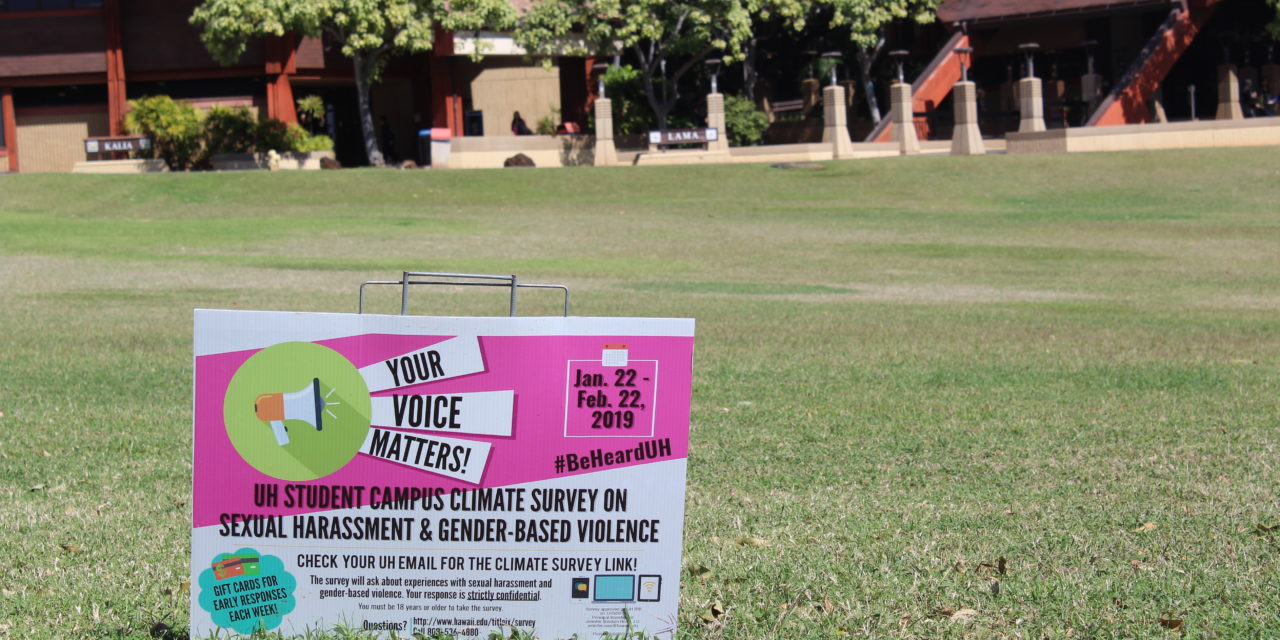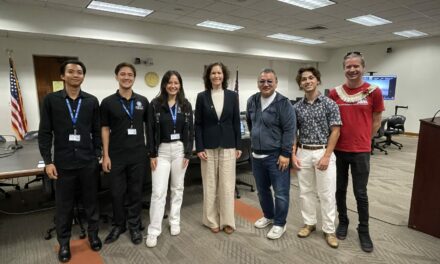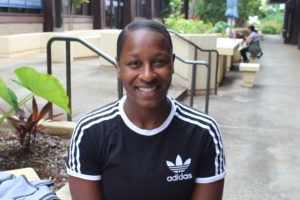By Lexus Yamashiro | Staff Writer
Since Jan. 22, students have been receiving emails asking them to fill out the UH Campus Climate Survey on Sexual Harassment and Gender-Based Violence online by Friday, Feb. 22. This optional survey is sent out every two years to all commuter and university campuses within the UH system as a way for them to gather information and data to develop an understanding of what situations students have encountered that involve sexual misconduct or violence.
Estimating around 20 minutes to fill out the survey, questions asking if students have ever experienced sexual harassment, sexual assault, or attempts of being sexually confronted provide students with a chance to anonymously share their experience through the survey. KCC’s Title IX coordinator Devon Peterson said that students who have never reported their cases through a channel on campus but are doing so through the survey is a stepping stone for them to speak up.
“It’s important for us to be aware of [misconduct happening on and off campus], to be knowledgeable that this happens because … these are topics that people don’t normally share with strangers, they may not share it with the people close [to them],” Peterson said. “So on one hand, you want our policy makers and leaders on campus to be aware that this is a problem … but also, I want fellow students to know if you’ve experienced this, you’re not alone.”
While answering these questions may encourage students to reach out to resources on campus, this is a survey that Peterson said should also be taken by students who have never experienced sexual misconduct. Questions that ask if students have ever suspected that a friend could have been sexually assaulted do appear as a way to see if they are aware of what resources are available to turn to for help.
A list of these resources found at the various UH campuses appear in the survey, those specific to KCC being Health Services, a Mental Health counselor, a Student Affairs counselor, and a Title IX coordinator. Gathering data through the survey on the awareness of options that students have to report a case helps each campus to know how knowledgeable its students are of campus resources and what can be done to improve raising awareness.
With the survey being conducted by OmniTrak Group Inc., the firm provides analytical services and will compile the results into a report of summary findings and executive summary for each campus to see the percentages of the different categories that were covered in the survey. A report of summary findings and executive summary were finalized for the first survey that was conducted in 2017, including highlights of the 2017 UH Campus Climate Survey results.
Although the UH Campus Climate Survey will only be open until Friday, Feb. 22, students still have another resource to turn to to report any violations of UH policies that are suspected to be or are actively happening on campus: the UH Whistleblower Hotline.
Launched in June 2016, the hotline is a 24-hour service that can be reached toll-free at 1-855-874-2849 by UH students, faculty, staff, administration, and even members of the public who witness misconduct occurring on any of the UH campuses. Those who call this number have the option to remain anonymous or provide their name to make a report.
If the nature of a call is serious, such as if it involves a student reporting against a UH employee for discrimination or a student reporting against a student for sexual assault, Peterson said that an investigation will most likely occur so that action can be taken to solve the issue at hand. For cases that involve sexual misconduct, these calls will get forwarded to the Title IX coordinators at the respected campus where the incident happened.
To raise awareness of the hotline’s existence, KCC Student Congress president Ally Villanueva spoke about it during Student Congress’ general meeting on Wednesday, Jan. 16. Being that many students are still unaware of the system-wide hotline and its purpose, the Psychology major said she hopes to continue to bring it to the attention of those on campus being that it is an accessible resource.
“In our recent conversations at Student Caucus, there’s been a lot of concerns about students having access to these resources based on their interactions with faculty or peers themselves and just having that way to reach out to somebody to get help,” Villanueva said during an interview. “Some people may not know how to get help, so [Student Congress is] there to give that helping hand and be like, ‘Hey … you don’t have to do it alone or go through it alone.'”






